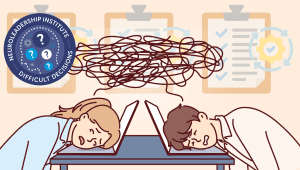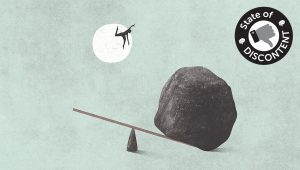
5 Essential Skills for a Changing Healthcare Industry
Post-pandemic, the healthcare industry has had to adapt in major ways to sustain leaders and employees.
Thank you for searching the NeuroLeadership Institute archives. Here’s what we were able to find for you.
Still having difficulty finding what you’re looking for? Contact us.

Post-pandemic, the healthcare industry has had to adapt in major ways to sustain leaders and employees.

Passionate employees are at risk of being exploited, leading to burnout and decreased productivity. Here’s how to ensure your passion doesn’t lead to unfair treatment.

In the face of relentless change initiatives, employees can experience burnout and resistance. Here’s how to increase engagement and reduce change fatigue.

Researchers have developed a tool to alert office workers when it may be time to take a break.

We can learn how to become more resilient through lessons from emergency department nurses.

Have a healthy summer by making time for rest, relaxation, and recreation.

By tapping into your heightened awareness of others’ emotional states, you can learn what your employees need and guide them effectively.

Conventional wisdom says sacrificing sleep to work longer hours is a path to success, but studies show missing sleep backfires.

Organizations can reverse passivity among employees by offering more autonomy.

Our best advice from 2022 on how organizations can help employees beat burnout.

Is exercising during work a solution for burnout?

More than a quarter of people who recently quit their job regret the decision. Here’s how to avoid future regrets.

Get closer to work-life symbiosis — a relationship that is regenerative to both employees and an organization — by following these three steps.

Strategies leaders can take to prevent moral injury from having a lasting, negative effect on their organization.

It’s incumbent on leaders to mitigate discontent. Here are three sustainable strategies based on science to help you retain your workers.

Resignations and job burnout are at a fever pitch. Here are three things managers and employees can do to make it through, according to science.

The extraordinary circumstances of the pandemic have given new weight to the end-of-year break, as the line between work and home has blurred more than ever for many workers. Some companies are trying to encourage their employees to disconnect from their jobs more than usual this year, as holiday routines and connections have been upended for many. Jim Mathis runs the small ad agency, Adwerx, in Sioux Falls, South Dakota. He’d normally have a full calendar during the holidays: the company party, visits to extended family and planning for a new year staff retreat. But this is 2020. “There’s just this lingering cloud over everyone that is just getting hard on folks,” he said. He’s encouraged his seven employees to take extra time off this week and next – they have unlimited vacation. “Definitely recharge your batteries,” he said. “We all need to do that. And this year, that’s been stressful, we probably need it more than normal.” Sheila Ryan is the Chief People Officer at Clear Capital appraisal services in Truckee, California. During this darker-than-usual end of the year, she’s trained managers to identify potential signs of burnout among their 600 employees. “You look for changes in behavior – were they really participatory and vocal in your meetings and now they’re being more quiet?” she said. “Are they getting more slouchy and turning their camera off a lot more?” If so, managers at her company have been reminding staff of mental health resources like the Employee Assistance Program and encouraging staff to take time off. Ryan said more people at her company have taken vacation days this holiday season than usual. Breaks are important for cognitive function, said David Rock, co-founder and CEO of the NeuroLeadership Institute, which applies neuroscience to work. “With the brain you need to literally let networks rest for a while for them to regenerate and come back energized,” he said. The brain gets tired out by repetitive stress, like constantly worrying about a pandemic, or thinking about work at all hours of the day, he said. “One thing we know about fitness is you don’t do three hours of repetition on the same muscle without stopping,” he said. But even with time off, pulling our brains out of work is easier said than done these days, said Jaclyn Jensen, who teaches organizational psychology at DePaul University. Because millions of workers have now combined their home with their workplace, “your mind is always at work, even if you are not actually sitting in front of your computer working,” she said. Finding a new routine during time off can help rebuild those boundaries, she said: spending time outside, reading or scheduling those things you don’t have time for during a busy work week. And by all means, stay away from email. “Several days ago, in anticipation of the holiday I did take my email off of my phone, and it is freeing,” she said. So much so, she might even leave it that way after the holidays are over. This article originally appeared on Marketplace.org.
Join millions of employees in creating culture change at scale by reaching out today.

In 2007, David and Lisa Rock and their team had been working in leadership development and executive coaching for ten years, when David coined the term “NeuroLeadership.”ef

North America
Africa
South America
Asia
Europe
Australia
© NeuroLeadership Institute 2025. All Rights Reserved
This site uses cookies to provide you with a personalized browsing experience. By using this site you agree to our use of cookies as explained in our Privacy Policy. Please read our Privacy Policy for more information.